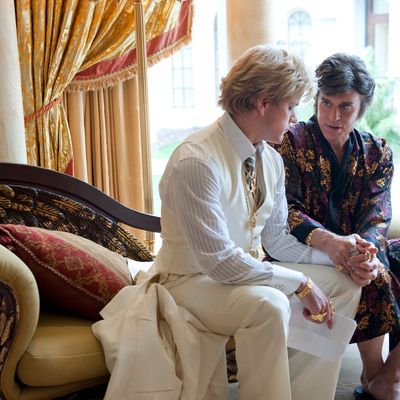
Michael Douglas couldnÔÇÖt speak. Seated on the dais at a Cannes press conference for Behind the Candelabra, he looked at his creative collaborators ÔÇö including co-star Matt Damon, director Steven Soderbergh, and producer Jerry Weintraub ÔÇö and suddenly went silent in the middle of his sentence. When he began speaking again, emotion choked the actorÔÇÖs voice. ÔÇ£Sorry,ÔÇØ he said tentatively, tears in his eyes. ÔÇ£It was right after my cancer that this beautiful gift [of a movie] was handed to me. IÔÇÖm eternally grateful.ÔÇØ
Behind the Candelabra is a funny picture: funny in some laugh-out-loud ways, but also funny as in unusual. For example, itÔÇÖs DouglasÔÇÖs first starring role since he was diagnosed with cancer in 2010, but itÔÇÖs also SoderberghÔÇÖs last movie before his declared retirement. The film earned a gala competition slot at Cannes and will play in theaters all over Europe, yet American movie studios passed on the film, consigning it to a television berth on HBO, premiering this Sunday. And despite all the glitter and over-the-top camp comedy of its milieu ÔÇö this is a biopic of the flamboyant pianist Liberace, after all ÔÇö the film can boast several authentically emotional moments, which are all the more surprising since SoderberghÔÇÖs output is usually so cool and unsentimental.
The 68-year-old Douglas plays Liberace as a glitz-addicted kitsch superstar (ÔÇ£I personally support the entire Austrian rhinestone business,ÔÇØ he jokes at one point, and you believe him) who makes quite an impression on his new lover, the much younger Scott (Matt Damon). It isnÔÇÖt long before Scott becomes accustomed to LiberaceÔÇÖs wealth and cruise-y sexuality, and before long, Liberace is literally remaking Scott in his image via plastic surgery (done by a riotously pinched and pulled Rob Lowe). Relationships often hit a patch where one partner tries to transform the other, but rarely does that come with chin and cheek implants.
Soderbergh said at the press conference that he was trying to pitch Candelabra for years to obstinate studio executives: ÔÇ£The sense from them was, ÔÇÿWeÔÇÖre not convinced that thereÔÇÖs an audience for this film, except for people who are gay.ÔÇÖÔÇØ But he doesnÔÇÖt see HBO as a consolation prize. ÔÇ£Our attitude at the end of the day was, You know what? More people are going to see it,ÔÇØ he said. ÔÇ£Certainly, thereÔÇÖs a lot of great TV being made in the States right now, and in terms of cultural real estate, I feel like TV is really taking control of a conversation that used to be sort of the exclusive domain of movies. I donÔÇÖt view this as good or bad, itÔÇÖs just what it is.ÔÇØ
In fact, when it comes to the filmÔÇÖs unabashed gay sexuality, the move to a permissive premium cable channel may have only aided Soderbergh. ÔÇ£In terms of being in bed with Michael Douglas, I now have things in common with Sharon Stone and Glenn Close,ÔÇØ said Damon. ÔÇ£We can all go out now and trade stories.ÔÇØ Those in the press who saw the film today were buzzing about DamonÔÇÖs many nude moments, including one scene in which Scott and Liberace argue before bed, a domestic conflict briefly interrupted when frequent sunbather Scott undresses, revealing a distinctly European tan line. ÔÇ£IÔÇÖm really proud of that scene,ÔÇØ laughed Damon. ÔÇ£My behind is very large in the scene, but itÔÇÖs out of focus, because the focus is thrown deep to Michael. WeÔÇÖll see it on the biggest screen ever tonight, which will be jarring.ÔÇØ
Damon says that he himself suggested the moment to Soderbergh after a tanning session gone wrong. ÔÇ£And Steven just looked at me for a long time, and he goes, ÔÇÿOh, I know where to put the camera,ÔÇÖÔÇØ recalled Damon. ÔÇ£I did warn every guy on the crew. I said, ÔÇÿListen, this is not something you can unsee. YouÔÇÖre all welcome to look, but you canÔÇÖt unring that bell. ItÔÇÖs going to be seared into your memory if you choose to look!ÔÇÖÔÇØ
Earlier in his career, Soderbergh mostly eschewed nudity in his films; once, while discussing the sexy but unrevealing love scene he directed in Out of Sight, Soderbergh explained, ÔÇ£When an actor takes off their clothes, the movie becomes a documentary.ÔÇØ Today, I asked the filmmaker whether his comparatively fleshy films of recent vintage ÔÇö especially Magic Mike and Candelabra ÔÇö have marked a change in attitude.
ÔÇ£No, I donÔÇÖt think so,ÔÇØ he said, after some consideration. ÔÇ£ThereÔÇÖs still that line, I think, where if you cross it, you do sort of take people out of the film. In this case, when Matt told me the story of the Brazilian spray tan, I just felt that the world really needed to see this, so I was looking for opportunities. And we found them! Give the people what they want, and theyÔÇÖll show up.ÔÇØ
But will Soderbergh keep delivering what audiences want? While heÔÇÖs often said that Candelabra would be his last film, itÔÇÖs impossible not to notice how much fun the director has seemed to be having in his three most recent pictures. Asked today to reiterate his plans for retirement, SoderberghÔÇÖs denials sounded suddenly less Shermanesque.
ÔÇ£As far as this being my swan song, I donÔÇÖt know,ÔÇØ he said. ÔÇ£IÔÇÖm absolutely taking a break. I donÔÇÖt know how extended itÔÇÖs going to be.ÔÇØ In any case, Soderbergh is happy with the period heÔÇÖs put on a career that began with Sex, Lies, and Videotape, a Sundance hit that also came to the Croisette 24 years ago. ÔÇ£I canÔÇÖt say that if this were the last movie I made, I would be unhappy,ÔÇØ he said, smiling. ÔÇ£IÔÇÖm really, really proud of this film.ÔÇØ

